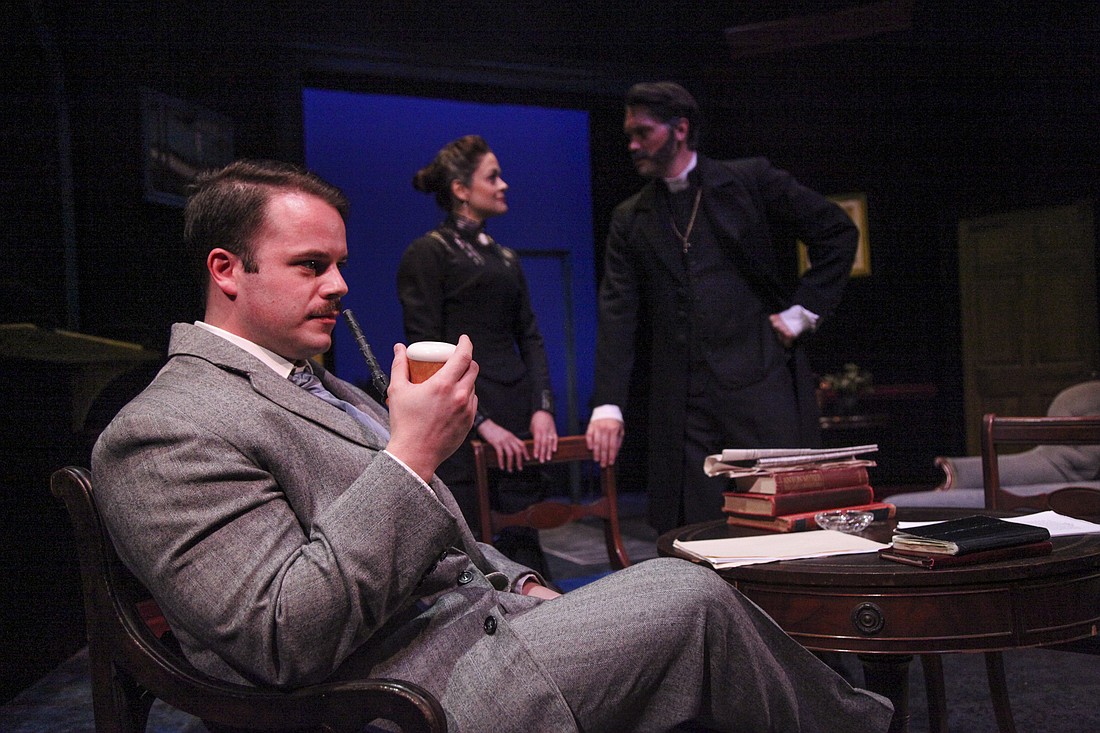- July 26, 2024
-
-
Loading

Loading

Henrik Ibsen was a fearless social critic. He had his axes to grind — and he swings them all in “Ghosts,” the latest FSU/Asolo Conservatory for Actor Training offering. His targets include: religious hypocrisy, patriarchal bullies, the second-class status of women, blind conformity, and the fear of social disapproval. (To Ibsen, that was the root of all the other evils.)
But look on the bright side …
The play starts on a positive note — and it’s downhill from there. Young Osvald (Marc Bitler) has been living la vie bohème in Paris. Inexplicably, he returns to his isolated home in the Norwegian countryside. His mother, Helene (Carla Corvo) is a wealthy widow. She’s preparing to launch an orphanage in honor of her late husband — a saintly fellow by all accounts. Her childhood friend, Pastor Manders (Jonathan Grunert) is on the scene to offer free spiritual advice and help with the paperwork. (Always a nuisance, especially in Ibsen’s plays.) Things are looking great! What could possibly go wrong?
Basically everything. And it does.
What’s the worst you can imagine?
That’s what happens. And then some.
The slide into suffering takes a while. Ibsen ratchets up the tension with cruel clockwork. The scenes progress from grim revelation to grimmer revelation. (Incest, syphilis, arson, suicide — pretty much all the bad parts of the Bible.) The surprises aren’t surprising. If you grew up watching Alfred Hitchcock movies, you can see what’s coming a mile away. But it still hurts to watch.
There’s more than theatrical masochism at work, let’s be clear. The play’s painful spectacle is Ibsen’s diagnosis of his country. What was wrong with Norway in 1882?
Diagnosis: spiritual paralysis.
Director Andrei Malaev-Babel evokes that illness with static blocking. The characters are literally stuck in rigid positions. They’re locked into themselves, avoiding eye contact, and barely relating. They take turns making self-justifying speeches that don’t qualify as real conversations. There’s abundant talk and little connection. Until it’s too late …
It’s a dark play and Chris McVicker’s moody lighting fits the bill. (There’s only one burst of brightness in an ironic, false dawn.) His set-design is also appropriately haunting — a cheerless, bourgeoisie prison cell. Sofia Gonzalez’ paper doll costumes complete the soul-killing artificiality. Alex Pinchin’s sound design evokes other voices, other rooms. But it’s a subtle sense of creepiness. Not a haunted house. Not a fun house, either …
And no happy ending. As you’ve probably guessed.
And you’d be right.
The train wreck logic of inevitable doom is perversely fascinating. But Ibsen’s logic isn’t always clear. At times, the underlying argument gets in the way of the actors’ work. (Rolf Fjelde’s lead-balloon translation does, too.)
But the second-year students actors do their best.
Joe Ferrarelli’s club-footed Jakob is a garden-variety grifter. A carpenter, but not very Christlike. Jakob keeps ducking his work and sticking his nose in the family business. He’s obviously up to something. (Pandering his supposed daughter? A phony home for wayward sailors to extract money from suckers?) I didn’t get it then. I still don’t. Grunert’s Pastor Manders is the worst kind of high-class grifter. He actually believes in what he’s selling. His character’s half-life coach, half-business consultant — and his advice is always lousy.
Alex Pelletier’s Regina is underwritten. She’s (supposedly) just a servant girl with dreams of Paris. But Pelletier manages to evoke sympathy in her few, brief appearances. Bitler’s infected Osvald oscillates between dead-eyed passivity and jittery excitement when he’s lusting after Regina. Corvo’s Helene is the emotional eye of the storm. She’s an amazingly tough, resourceful woman, and she's the only fully sane character on stage. But Helene lays her powers to waste to appease the ghost of respectability. She married an oversexed, alcoholic sea captain and then valiantly struggled to hide his boozing and adultery. Helene started the doom train in motion with that futile act of self-sacrifice. After the captain died, she kept the sanitized lie alive. And kept the doom train going with more self-sacrifice …
Self-sacrifice will kill you.
That’s the true heart of Ibsen’s diagnosis.
Self-sacrifice is the virus responsible for Norway’s spiritual paralysis. (Self-sacrifice in the name of phony respectability, specifically.) In the gospel according to Ibsen, “What will people think” is the root of all evil. His fellow Norwegians ruined their lives to keep up appearances. Why? If they’d simply drop their masks, admit their true affections and stop trying to be respectable, they’d be a whole lot happier.
That’s Ibsen’s implied prescription.
But it takes a spoonful of sorrow to make the medicine go down.